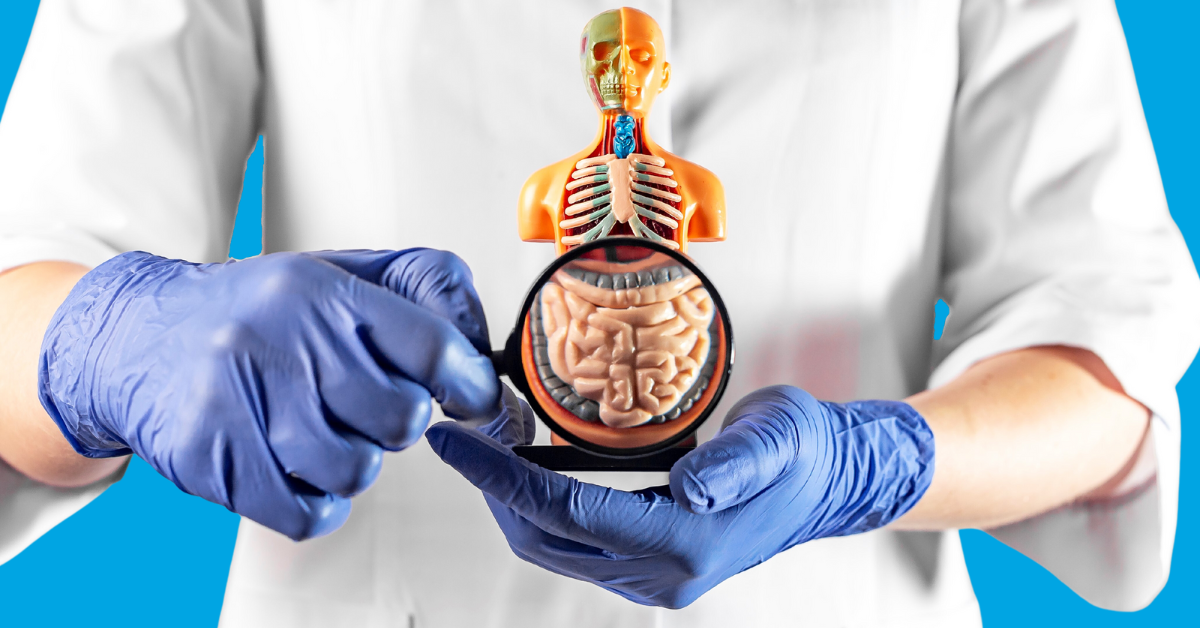
People with diabetes (PWD) are at an increased risk of developing digestion problems. Your Gastrointestinal (GI) system plays a major role in extracting the nutrients that help sustain optimal body health. So let’s take a look at this fantastic system.
Your GI system consists of your mouth, esophagus (long tube to your stomach), small and large intestines, rectum, and anus.
Hormones, muscles, and nerves are pivotal in helping your gastrointestinal system break down food, absorb nutrients, and move waste out of your body. Your GI system deconstructs the food you take in and extracts the nutrients your body needs.
For example, your salivary glands produce saliva and, along with your teeth, are part of the first process of utilizing food for energy and storing it for later use. In addition, saliva helps to remove foreign invaders from your mouth. Muscles in the esophagus help carry the food from your throat to your stomach. In addition, you have specialized cells that produce hydrochloric acid, which is highly acidic and essential to breaking down food and preventing food-borne illnesses.
Helpers known as accessory organs with the GI system include the gallbladder, liver, and pancreas. Among several other roles, the liver supplies glucose when needed and helps detoxify the body. As you know, the pancreas releases hormones, insulin, and glucagon to manage your blood sugars and secretes enzymes to help break down carbohydrates, fats, and proteins.
At any point, your GI system can experience a disruption in its function. For example, uncontrolled blood sugars can affect the salivary glands, causing decreased saliva production and affecting food breakdown. Dry mouth, a common side effect of high blood sugars, can increase your risk for bacterial infections and swollen gums and teeth, negatively affecting appetite, chewing, and nutritional intake. In addition, food can back up in the esophagus, leading to indigestion and heartburn and causing further damage to the tunnel that carries the food to your stomach.
Nerves permeate your digestive system and allow food to pass through. Damage to these nerves can cause autonomic or proximal nerve damage. Autonomic neuropathy can cause you to experience constipation, diarrhea, nausea, and vomiting. Gastroparesis is a common type of neuropathy associated with diabetes. Another form of neuropathy not commonly talked about is proximal neuropathy, which can lead to severe stomach pain.
Inflammatory conditions such as Crohn’s and Irritable Bowel Disease can prevent your body from absorbing vitamins B and C and folate. Vitamin B is known to protect nerves, while Vitamin C plays a role in maintaining healthy skin and preventing infections. Folate helps with cell growth and blood formation. As you know, your entire body needs adequate blood circulation, including your GI tract. Damage to accessory organs, such as the liver and pancreas (cirrhosis and pancreatitis), often associated with excessive drinking, can also occur.
There are some steps you can take to help keep your gastrointestinal system in good shape.
Eating whole grains (except with allergic conditions, damage to your GI tract, or immune disorders such as celiac disease) is a good way to support gut health.
Drinking water, getting adequate restful sleep and physical activity, and managing your stress, are all ways to promote GI health. Water helps to move food along your digestive tract and flush out waste.
Fruits and vegetables provide the necessary fiber to add bulk to your stool, and antioxidants help maintain cell integrity. Beans have a low glycemic index and are rich in several micronutrients, including zinc (skin health), calcium (bone and teeth health), and magnesium (muscle and nerve health). Check out some of these bean recipes from the Academy of Nutrition and Dietetics.
Probiotics and Prebiotics are often encouraged to maintain gut health. Probiotics such as yogurt and dietary supplements contain live microorganisms such as lactobacillus. Prebiotics are foods that support the good bacteria in your body. Some good sources include bananas, onions, and garlic.
Discuss ways to improve your gastrointestinal health with your healthcare provider, Registered Dietician, and Certified Diabetes Care and Education Specialist (CDCES).
Creating meals to support your GI system doesn’t have to be hard. Here are some recipes from EatingWell to get you started.